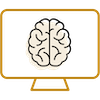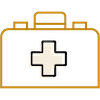Digital clinical portfolio system
A journey from paper to screen
In response to staff and student feedback, TELT led a project to implement a new digital clinical portfolio system called risr/advance for students to use for their workplace-based assessments (WBA) while undertaking work-integrated learning on clinical placements in hospitals and GP practices during their third and fourth year of study in the MChD. More than 150 portfolio items were moved from the previous paper-based system and translated into risr/advance through a collaboration between TELT, the Assessment team, and block and discipline chairs from both urban and rural areas.
Project snapshot





No more need for paper forms

Platform works well on mobile devices

Easy to get feedback in busy clinical environments

Students receive more detailed feedback and write reflections on their learning.
What was the issue?
Medical students spend two years of the program on clinical placements in hospitals, GPs, and community health and need to complete a portfolio demonstrating their learning. The portfolio asked for signatures from doctors, nurses and other allied health staff to indicate they had witnessed the student perform a key skill or task.
The portfolio was completely paper based: it relied on students to print out the required tasks, have them signed off, and then upload them back into Wattle, the learning management system. These tasks were due by the end of the year and on many occasions students lost their paperwork or struggled to complete tasks, which could lead to a lack of transparency on student progress during the year. There was also no oversight on the quality of feedback that students were receiving or who was providing this feedback to the students. There was no way to capture this information for students to improve, and there was a risk of students getting signed off by inappropriate assessors, such as other medical students.
Feedback from students and their clinical supervisors indicated that they found this approach difficult to use and it was not easy to identify students at risk. Internal and external reviews highlighted the need for this aspect of the assessment to be overhauled.
What was the solution?
TELT collaborated closely with Assessment team and relevant clinical and academic leads to analyse the needs of the program, and undertook a procurement process to purchase a clinical workplace-based assessment platform called risr/advance.
risr/advance is a web-based portfolio that is accessible to students from anywhere, at any time, using any device. Students can have bedside sign off from their clinical placement supervisors and have the feedback on their tasks documented in real-time. There are reflective components on every item encouraging students to develop introspective skills. The reflections require students to consider how they went with the task and what feedback they received from professional staff to improve their learning.
The TELT and Assessment team mapped the paper-based portfolio requirements into a more streamlined portfolio for both rural and urban students, ensuring the students would have a more equitable experience no matter where they undertook their placements.
risr/advance provides a student with a dashboard to track their progression against ‘goals’ which are a reflection of their mandatory portfolio items creating clarity for students across the portfolio. For the Assessment team, reports were built that can be refreshed and downloaded at anytime that give a better ‘real-time’ picture of where students are up to with their completed or incomplete items. Given the amount of information that can be extracted from the system about student progress, it has brought about constructive conversations with academics and assessment staff about how to identify student who need early intervention.
Testimonials
Evaluation
In June 2023, a survey was sent to year 3 students to complete about their experience with the platform. Students reported that they liked risr/advance because of the clarity it provided them on their mandatory tasks. They experienced personal satisfaction and sense of completion when they completed a task and watched their goals change to green. They liked that is was paperless and easily accessible on their different devices resulting in a more environmentally friendly portfolio.
The Team
- Leesa Grimm (TELT)
- Claire Wardle (Assessment)
- Yili Peng (TELT)
- Katie Freund (TELT)
Thanks to the block and discipline leads for their hard work on this project:
Associate Professor Alex Webb, Dr Nicholas Taylor, Dr David Kramer, Dr Di Whiteman, Dr Carolyn Hawkins, Dr Charles Bou Sleiman, Dr Karlee Johnston, Dr Katrina Anderson, Dr Karen Flegg and Dr Amanda Barnard.